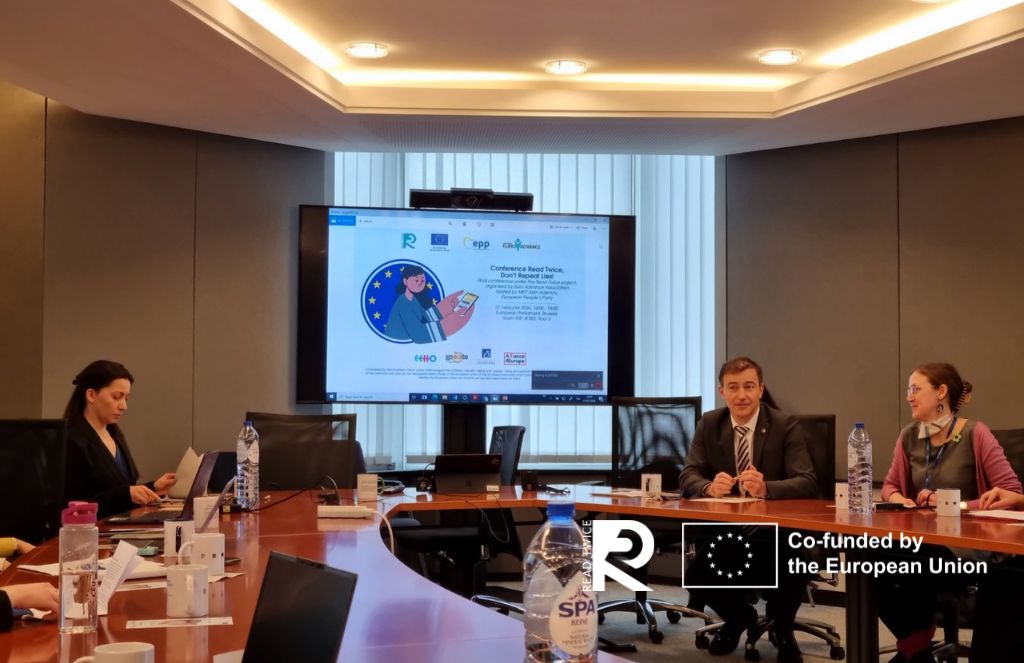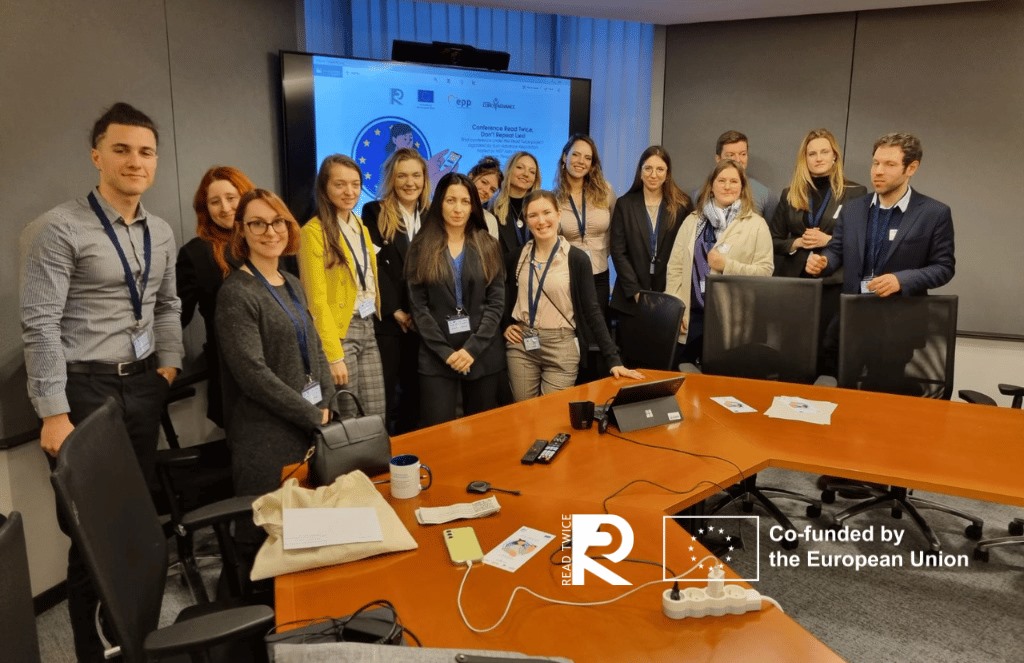Thessaloniki gets ready for its metro launch in November
The underground rapid transit lines have been under construction for almost two decades due to various project delays
 TheMayor.EU logo
TheMayor.EU logo The concluding event of the pan-European project took place in the European Parliament where young media practitioners met MEPs to debate the issue of disinformation
Yesterday, 21 February, the “Read Twice, Don’t Repeat Lies” conference took place at the European Parliament. This was the concluding event of Read Twice (R2) and as such it served as the gathering platform for all the participants in the project that has evolved a lot in the past year and a half. It was organised by Euro Advance Association and hosted by MEP Asim Ademov (EPP).
Given the context of the conference, the event served as a platform to bring about another dimension of false information that hasn’t been much touched upon in the previous seminars – politics and the political (dis)empowerment of the European youth. With an eye on the upcoming European elections in June, the setting couldn’t have been better suited for the purpose.
The young media practitioners had the opportunity to meet MEPs and communication experts from the European Parliament.
It was the Bulgarian MEP Asim Ademov who opened the conference with a brief but impactful speech.
Disinformation will be the third of fourth political force by representation in the European elections. Disinformation elects presidents and already has its own political parties,” declared Mr Ademov.
He went on to give examples of populist, far-right and pro-Russian parties, which have already gained a foothold in national parliaments, such as the one in his native country, and are preparing to also run in the upcoming EU elections. It was a stark reminder that sinister foreign-origin disinformation will not just be a buzzword but will have a very concrete political presence in the seats of the continental legislature.
The participants then had an honest, no-holds-barred discussion about the challenges and perceptions of Foreign Information Manipulation and Interference (FIMI) with another MEP, Andrey Kovachev (also from Bulgaria), and with Sara Ahnborg from the European Parliament Spokesperson’s Unit.
Mr Kovachev put forward the argument that not only the institutions but also the social media giants that serve as platforms for the broadcasting of propaganda campaigns were simply not doing enough about the problem. By misinterpreting and applying the “right of other point of view” obliquely they allowed the dissemination and the normalization of sinister and decidedly criminal narratives whose only goal is the dismantling of democracy.
Such narratives should be no-go topics today, just like praising Hitler had become a no-go topic in the past. They shouldn’t enjoy the freedom of dissemination under the guise of the right of opinion. There should be a common understanding in the mainstream and social media platforms to decrease the visibility of posts and news items that promote an openly anti-democratic agenda,” said Andrey Kovachev.
He praised the EU’s Digital Services Act, which obliges large digital platforms to report transparently their policies regarding harmful content and advertising, as a step in the right direction, but that it still remains to be seen whether it will have a profound effect.

MEP Andrey Kovachev spoke about the need for "no-go zones" in the democratic debate. Source: Euro Advance
The young media practitioners from Bulgaria, Croatia and Romania, who were involved in all aspects of the R2 project, then stepped up in the second part of the conference to share their experiences and the insights they had gained during the project’s life.
The common theme among all of them was a newfound sense of understanding for the media literacy issues plaguing their own countries, which unfortunately rank low in the index studying that parameter.
The youth united around the idea that the national governments of the Southeastern European countries had to urgently develop strategies that would introduce digital media literacy as an obligatory component in the local educational systems, from the youngest pupils to university levels.
The work of authorities, however, would not be enough and the Balkan countries also need stronger civic participation to encourage such developments and to make them meaningful and popular among the grassroots communities.
Regarding the Read Twice project itself, the youth were impressed with the way it was structured and how it allowed them to peek into the world of professional experts, such as seasoned journalists, and to see the tools they use to verify veracity. That sense of mentorship and transmission of knowledge between generations was praised as particularly valuable and something that needed to be applied on a larger scale in society.

The young participants of the R2 project unite around common themes when it comes to tackling disinformation in their home countries. Source: Euro Advance
The Read Twice partnership project involves Euro Advance Association (Bulgaria) (as coordinator), Udruga Echo (Croatia) and Se Poate (Romania) associations together with CICANT Research centre (Lusofona University, Portugal) and Alliance4Europe (Germany) as expert partners.
Co-funded by the European Union under CERV programme (Citizens, Equality, Rights and Values). Views and opinions expressed are however those of the author(s) only and do not necessarily reflect those of the European Union or the European Education and Culture Executive Agency (EACEA). Neither the European Union nor EACEA can be held responsible for them.

The underground rapid transit lines have been under construction for almost two decades due to various project delays

Now you can get your wine in Talence by paying directly in Bitcoin

That’s because the state has to spend money on updating the railway infrastructure rather than subsidizing the cost of the popular pass

Rethinking renewable energy sources for the urban landscape

The examples, compiled by Beyond Fossil Fuels, can inform and inspire communities and entrepreneurs that still feel trepidation at the prospect of energy transition

Now you can get your wine in Talence by paying directly in Bitcoin

The 10th European Conference on Sustainable Cities and Towns (ESCT) sets the stage for stronger cooperation between the EU, national and local level to fast track Europe's transition to climate neutrality.

At least, that’s the promise made by the mayor of Paris, Anne Hidalgo

The underground rapid transit lines have been under construction for almost two decades due to various project delays

At least, that’s the promise made by the mayor of Paris, Anne Hidalgo

Hostal de Pinós is located in the geographical centre of the autonomous region

Despite its church-y name, the district has long been known as the hangout spot for the artsy crowds

Urban dwellers across the EU are having a say in making their surroundings friendlier to people and the environment.

Forests in the EU can help green the European construction industry and bolster a continent-wide push for architectural improvements.

Apply by 10 November and do your part for the transformation of European public spaces

An interview with the Mayor of a Polish city that seeks to reinvent itself

An interview with the newly elected ICLEI President and Mayor of Malmö

A conversation with the Mayor of Lisbon about the spirit and dimensions of innovation present in the Portuguese capital














